Agric minister wants research institutes to commercialise findings
Audu Ogbeh, Minister of
Agriculture, has urged agricultural research institutes in the country to
intensify their research efforts and commercialise their findings in order for
the Federal Government to realise its economic blueprint.
Ogbeh who stated this while
declaring open the National Root Crops Research Institute (NRCRI) Umudike, Abia
State, 2017 annual research review, said the institutes need to play key roles
in the country, stressing that the role of NRCRI remains critical.
Represented by Dr. Rasak Oyeleye,
he said the Federal Government is very much committed to ensuring food security
in the country. “Farmers face difficulties in obtaining knowledge and services
that could improve their cultivation practices, increase their production
outputs, reduce drudgery, reduce post-harvest losses and provide them with
access to reliable market and policy information.”
The acting Executive Secretary of
the Agricultural Research Council of Nigeria (ARCN), Prof Aah Voh, said in
achieving food security and poverty reduction, there is need to increase the
productivity of crops, livestock and fisheries, using improved technologies,
which he said, is what the agricultural system is primarily mandated to do.
He said if this situation
remains, especially within the context of food price shocks, global economic
recession and increased climatic and disease challenges, poverty and
malnutrition are likely to increase. He enjoined all the review workshop
participants to come up with workable recommendations that will improve
Nigeria’s agriculture in general and agricultural research in particular.
Presenting the NRCRI annual
performance report, the Executive Director, Dr Julius Okonkwo said within the
past four and a half years, active research work has been sustained and demand
driven technologies developed despite the challenges of low funding and late
release of funds.
He said three high Vitamin A
Cassava varieties were developed and released to farmers, bringing the total
released by NRCRI in collaboration with International Institute for Tropical
Agriculture (IITA), Ibadan to six, even as four other White cassava varieties
were additionally released.
He noted that two Hybrid yams
were also developed and released to farmers in addition to four Yam land races
that were registered for research and production




Comments
Post a Comment